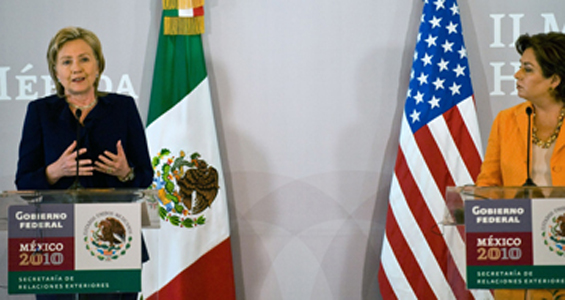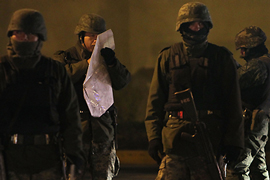Hillary’s spring break
US secretary of state visits Mexico and discusses war on drugs following murder of three US consulate staff.

 |
| The US secretary of state, left, during her Mexico trip called for a joint strategy to confront the drug cartels [AFP] |
This time last year, as US college students headed to the beaches south of the border for the annual holiday known as Spring Break, Hillary Clinton, the US secretary of state, delivered a very sober and contrite speech in Monterrey, the northern Mexican city.
She acknowledged the central role US demand for drugs played in the rise of the narco-cartels in its southern neighbour, and the battle for control of the trade that was destabilising both Mexico and the region. It was a frank admission, and appeared to herald a new approach to a transnational problem.
This dramatic change in perspective, however, has so far not yielded any new policy.
The Bush-era Merida Initiative, which funds an almost exclusively militarised approach to the supply side of the drug trade, continues to be the sole mechanism by which the US confronts its shared responsibilities.
Grisly murders
One year later and Clinton is back in Mexico, but, with the most famous resorts now the scene of grisly murders, the number of US college students daring to make the traditional journey south has dwindled.
| In depth | ||
|
It has been clear for some time that the war on the cartels, launched by Felipe Calderon, the Mexican president, with US support has neither stemmed the violence, nor the flow of drugs northward. The gangs have only grown more brazen, and the fight over territory and smuggling routes more fierce.
With a crowded foreign policy agenda, the US appeared ready to live with the situation south of the border. And it may very well have considered the policy towards Mexico a success, until the murder earlier this month of three employees of the US consulate in the restive border city of Ciudad Juarez; two of them US citizens.
Of the more than 3,000 drug related murders in Ciudad Juarez this year, these three are the first to have elicited expressions of disgust from Barack Obama, the US president.
But the US policy has continued to be one of containment, focussed on encouraging Calderon from afar, with money and hardware, and securing the border.
There has also been official recognition that much of the cartel’s firepower is smuggled from the north, but the emphasis on the border is in response to the national hysteria over illegal immigration, and the fear of spillover violence from the drug war raging to the south.
US reaction
The killings of the US consulate employees in Ciudad Juarez have forced a re-evaluation and prompted immediate action as they were a challenge not only to the authority of the Mexican state, but to the northern neighbour as well.
A direct assault on the power and prestige of the US could not go unanswered.
 |
| Mexicans demand Calderon focus more on law and order and less on the drug trade [AFP] |
It explains the size of Hillary Clinton’s entourage on her return trip to Mexico. This included, amongst others, two members of Obama’s cabinet, the director of national intelligence, and the chairman of the joint chiefs of staff.
What is not clear is whether this show of diplomatic force had any other purpose than to convince Calderon to stay the course, despite widespread public disapproval of his war.
To paraphrase Jorge Castaneda, a former Mexican foreign minister, every Mexican president has two key constituencies: his voting public and the US.
The two rarely cohere, but their differences now are starkly apparent.
Recent poll results suggest that a majority of Mexicans believe Calderon’s strategy has failed, and that the cartels are winning. The use of the army as an instrument of social policy, at the core of the president’s approach, is now seen as contributing to public insecurity, rather than controlling it.
On his last visit to Ciudad Juarez, Calderon was met with demonstrators demanding that he focus more on law and order, and less on the drug trade. This is a distinction not lost on the cartels.
The notorious band of former soldiers, known as the Zetas, have hung sheets across the country, all inscribed with the same message offering to eliminate petty crime in exchange for being left alone in their business with the north.
‘Wrong war’
This is an appeal, bizarre as it may be, to the popular perception that Calderon is fighting the wrong war. Drugs are a US problem. The main concern in Mexico is crime, and the constant torment of robberies and kidnappings, on which neither the army, nor the war it is waging, have had any effect.
Under pressure, Calderon has begun experimenting with new policies. In Ciudad Juarez he announced a shift in focus towards investments in social programmes, and job creation, in an attempt to address the underlying causes of crime.
While to the east, in the border city of Reynosa, there is the suspicion that the cartels are being allowed to fight it out, in the hope that violence will subside once a single, unchallenged victor emerges. There are no plans for the army to return to the barracks.
On her trip south, Clinton made tantalising statements about ignoring borders and bureaucracies in her effort to develop a joint strategy to confront the cartels. This has led to the same sort of expectation that her last visit generated, of a new, trans-national phase in the drug war.
There is rampant speculation in the Mexican press of what the approach might now involve, such as an international force operating on both sides of the border.
Yet as exotic as the ideas might be, Clinton has been categorical in her rejection of the one change in policy that would significantly dilute the effect of US demand, while recognising that it will never disappear.
When asked whether she would contemplate the legalisation of drugs, she answered with a single word answer – “No”.

